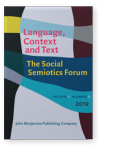Vol. 1:2 (2019) ► pp.260–287
Reflection literacy
Purpose, practice and possibilities
Reflection literacy (Hasan 2011 [1996]) proposes that literacy education should orient learners towards critique and the creation of new knowledge. It is a vision for literacy education which deserves deeper consideration within the SFL community and beyond. A key component of reflection literacy is argued to be metalinguistic knowledge, which facilitates conscious reflection on meaning. This paper considers one way that reflection literacy might be enacted in elementary classrooms that are ‘tilted towards reflection’, arguing that dispositions of reflection can be developed from the early school years. Evidence is drawn from a series of case studies conducted in Sydney, Australia. Consideration is also given to how Hasan’s proposal might be used to develop future studies in the field.
Article outline
- 1.What is reflection literacy?
- 1.1Introduction
- 1.2Recognition literacy
- 1.3Action literacy
- 1.4Reflection literacy
- 2.Towards reflection literacy in practice
- 2.1Developing trajectories for reflection literacy in elementary schooling
- 2.2Theories informing practice
- 2.3Reflecting on patterns in literary texts
- 2.3.1Characterisation and narrative development in Piggybook
- 2.3.2Verbal Processes and narrative development in Pumpkin soup
- 2.3.3Reflecting on literature can support recognition and action literacies
- 2.4Reflecting on thematic choice across registers
- 2.4.1Initial orientations to Theme through familiar registers
- 2.4.2Reflecting on Theme to support writing
- 2.5Reflecting on language in Kindergarten
- 3.Reflection literacy in prospect
- 4.Conclusion
- Acknowledgements
- Notes
-
References
